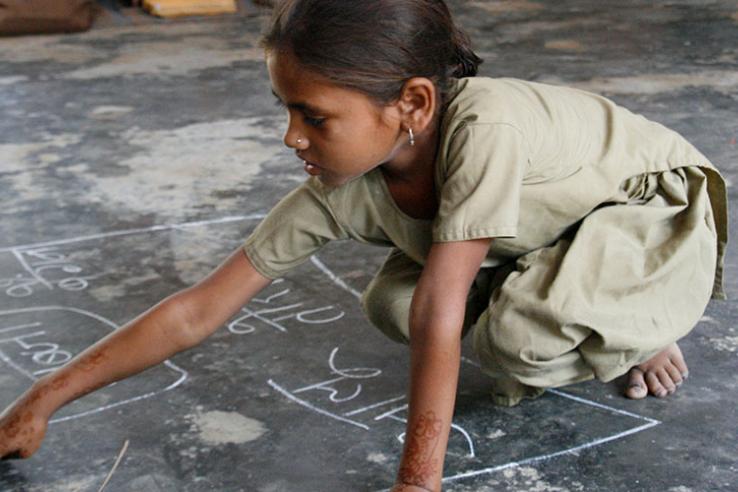May 2018 Newsletter

Announcing J-PAL's Policy Insights
Today, we’re launching an expanded library of short briefs called Policy Insights that highlight lessons emerging from randomized evaluations on topics in J-PAL’s nine sectors. Beyond summarizing results, Policy Insights discuss the mechanisms, theories, and/or insights about human behavior that help explain the results across studies and why they are similar or different. When combined with a detailed understanding of context and implementation, we hope these insights can be practical inputs for policy and program design.
J-PAL’s Sector Co-Chairs, sector experts in our network of affiliated professors, have taken the lead with our staff in developing each Policy Insight from a review of relevant randomized evaluations conducted by researchers both inside and beyond the J-PAL network.
Expanding access to higher education for refugees
The MicroMasters in Data, Economics, and Development Policy (DEDP) team at J-PAL announced a new partnership with ReACT Hub, an MIT initiative that connects refugees with opportunities in higher education. Starting in June 2018, ReACT will sponsor a cohort of refugees in the MicroMasters program by providing selected learners with access to scholarships for the five online MicroMasters in DEDP courses, in-person workshops with skills training, and paid internships in the field of development economics. Read more »
Evidence-Informed Decision-Making
Building the capacity of micro-entrepreneurs: Evidence from Chile
Small firms can play an important role in the labor markets of developing countries, but they often experience low growth and productivity. To build the capacity of micro-entrepreneurs, J-PAL affiliate Jeanne Lafortune (Pontificia Universidad Catolica de Chile), Julio Riutort, and José Tessada partnered with Simón de Cirene, a Chilean non-profit, to test the impact of adding role models or individual technical assistance to existing trainings.
Both interventions increased household income one year after the program ended, mainly through increased business participation and business income—but role model visits cost substantially less than individual consulting services. Based on the results of the evaluation, Simón de Cirene incorporated role model visits into all of its classes. Read more »
Featured Affiliated Professor
William Evans on holistic approaches to reducing poverty in the United States
In our most recent affiliate spotlight, William Evans (University of Notre Dame) discussed his partnerships with local agencies in the United States to evaluate case management services for low-income households. “Any time we get to spend time with the clients of programs that we evaluate and the people that help run the programs is uplifting. Economists are used to just looking at rows and columns in data sets. Putting a human face on the research is important and humbling.” Read more »
Featured Multimedia
D²P² series update: Making Donor Dollars Count
How much good does a given program accomplish per dollar spent? As part of the J-PAL and MIT Economics joint Data, Decisions, Public Policy (D²P²) lecture series, GiveWell co-founder Elie Hassenfeld spoke on “Making Donor Dollars Count: GiveWell's Approach to Selecting Charities.” GiveWell, a non-profit, identifies evidence-backed, cost-effective, and underfunded giving opportunities to help donors and individuals decide where to give. During his talk, Elie discussed applications of GiveWell’s approach, including its assessments of GiveDirectly and No Lean Season, and shared plans for the organization’s future. Watch the video »
Upcoming Trainings
Upcoming Evaluating Social Programs courses in India and Uganda
This summer, J-PAL is offering two sessions of its five-day executive education course, Evaluating Social Programs. J-PAL South Asia, in partnership with CLEAR South Asia, will host the course in New Delhi, India on July 16–20. J-PAL Africa, in partnership with IPA Uganda, will hold the course in Kampala, Uganda on August 6–10. Participants will gain a thorough understanding of randomized evaluations and receive pragmatic step-by-step training on how to conduct an evaluation. The content is designed for professionals from a variety of backgrounds: managers and researchers from international development organizations, foundations, governments, and non-governmental organizations from around the world, as well as trained economists looking to retool. Learn more and apply by May 21 for the course in New Delhi »Learn more and apply by June 22 for the course in Kampala »
Media Highlights
Big Brains podcast examines truths and myths about U.S. health care system
UChicago News
Family dynamics and water conservation: Evidence from Zambia
VoxDev
For sustained cleanliness, cities need tested sanitation solutions
The Wire
A puzzling success
American Economic Association
Power plants get 5-star rating in state pollution study
The Times of India
New Research Papers
The Value of Regulatory Discretion: Estimates from Environmental Inspections in India
Esther Duflo, Michael Greenstone, Rohini Pande, and Nicholas Ryan
Banking the Unbanked? Evidence from Three Countries
Pascaline Dupas, Dean Karlan, Jonathan Robinson, and Diego Ubfal
Dangers of a Double-Bottom Line: A Poverty Targeting Experiment Misses Both Targets
Dean Karlan, Adam Osman, and Jonathan Zinman
Using Gossips to Spread Information: Theory and Evidence from two Randomized Controlled Trials
Abhijit Banerjee, Arun G. Chandrasekhar, Esther Duflo, and Matthew O. Jackson
Tangible Information and Citizen Empowerment: Identification Cards and Food Subsidy Programs in Indonesia
Abhijit Banerjee, Rema Hanna, Jordan Kyle, Benjamin A. Olken, and Sudarno Sumarto
Featured Jobs
Policy and Research Manager, J-PAL Latin America & the Caribbean (Santo Domingo, Dominican Republic)